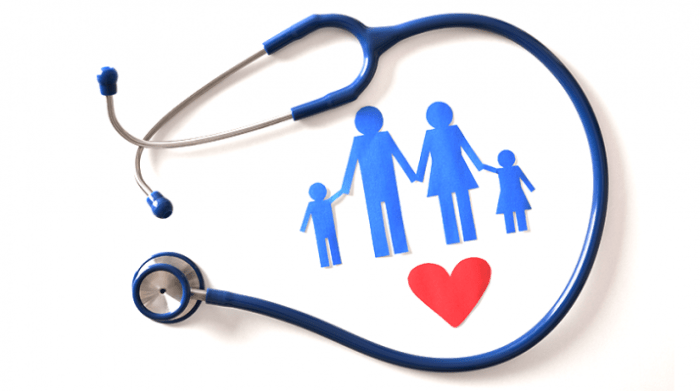DTC Family Health, a burgeoning sector, is transforming how families approach their well-being. Gone are the days of relying solely on traditional healthcare providers; now, families have access to a plethora of personalized health solutions at their fingertips. From genetic testing that unveils family predispositions to at-home diagnostics that offer convenient monitoring, the DTC family health market is brimming with innovative tools and services designed to empower families and improve their health outcomes.
This shift towards personalized health solutions is driven by a growing desire for greater control over family health and a thirst for proactive healthcare management. Families are increasingly seeking ways to identify potential health risks early, understand their unique genetic makeup, and develop personalized plans to optimize their well-being.
This demand has fueled the rapid expansion of the DTC family health market, offering a diverse range of services tailored to meet the specific needs of families across all stages of life.
DTC Family Health Market Overview

The direct-to-consumer (DTC) family health market is experiencing rapid growth, driven by increasing consumer demand for convenient and affordable healthcare solutions. This market encompasses a wide range of services, including telehealth, genetic testing, fertility treatments, and personalized health recommendations.
Key Players and Market Share
Several prominent players have emerged in the DTC family health market, each with a unique focus and target audience. These companies are actively shaping the market landscape and contributing to its ongoing growth.
- Teladoc Health:Teladoc Health is a leading telehealth provider, offering virtual consultations with physicians and other healthcare professionals. They cater to a wide range of medical needs, including primary care, mental health, and specialty services.
- 23andMe:23andMe is a pioneer in consumer genetic testing, providing insights into ancestry, health risks, and carrier status. Their services empower individuals to understand their genetic predispositions and make informed decisions about their health.
- Modern Fertility:Modern Fertility focuses on fertility testing and reproductive health. They offer at-home hormone testing kits and provide personalized guidance based on individual results.
- Ro:Ro provides telehealth services for various conditions, including erectile dysfunction, hair loss, and acne. They offer convenient online consultations and medication delivery, eliminating the need for traditional doctor visits.
Market Trends and Growth Projections
The DTC family health market is characterized by several key trends that are driving its growth. These trends reflect the evolving preferences and needs of consumers, as well as technological advancements that are enabling new healthcare solutions.
- Increased Adoption of Telehealth:The COVID-19 pandemic accelerated the adoption of telehealth services, as consumers sought convenient and safe alternatives to traditional healthcare settings. This trend is expected to continue, with telehealth becoming an increasingly integral part of healthcare delivery.
- Growing Interest in Personalized Medicine:Consumers are increasingly interested in personalized health solutions that cater to their unique needs and genetic predispositions. This has led to the rise of DTC genetic testing and other services that provide individualized health insights.
- Focus on Preventive Care:There is a growing emphasis on preventive care, with consumers seeking proactive ways to manage their health and prevent disease. DTC health services are well-positioned to meet this demand, offering tools and resources for early detection and intervention.
- Expansion of Service Offerings:The DTC family health market is expanding rapidly, with new companies and services emerging regularly. This innovation is driving competition and pushing the boundaries of what is possible in consumer healthcare.
The DTC family health market is expected to continue its rapid growth in the coming years. According to a recent report by Grand View Research, the global DTC genetic testing market is projected to reach USD 13.4 billion by 2028, growing at a CAGR of 17.8% during the forecast period.
This growth is fueled by factors such as rising awareness of genetic testing, increasing accessibility, and declining costs.
Types of DTC Family Health Services

The direct-to-consumer (DTC) family health market offers a diverse range of services that empower individuals and families to take control of their health and well-being. These services provide convenient and accessible options for genetic testing, at-home diagnostics, personalized health plans, family health apps, and telemedicine consultations.
Genetic Testing
Genetic testing allows individuals to gain insights into their genetic makeup, identifying potential health risks and predispositions. This information can help them make informed decisions about their health, lifestyle, and preventive measures.
- Carrier Screening:This type of testing helps identify individuals who carry a gene mutation for a specific genetic disorder. It is particularly important for couples planning to have children, as it can help them understand the risk of passing on the disorder to their offspring.
For example, cystic fibrosis carrier screening can help couples determine the risk of their child inheriting the condition.
- Predictive Testing:This testing assesses the risk of developing certain diseases later in life based on genetic predisposition. For example, BRCA1 and BRCA2 gene testing can help identify an increased risk of developing breast and ovarian cancer.
- Ancestry Testing:This type of testing explores an individual’s ancestral origins by analyzing their DNA. It can provide insights into their family history, migration patterns, and genetic heritage.
At-Home Diagnostics
At-home diagnostics offer convenient and accessible ways to test for various health conditions without visiting a healthcare professional. These tests provide individuals with immediate results, allowing them to monitor their health and seek medical attention if necessary.
Direct-to-consumer (DTC) family health services are becoming increasingly popular, offering convenient and accessible options for managing family wellness. One example of a reputable provider is medford atrius health , which offers a range of services from virtual consultations to in-person appointments.
While DTC services can be a great starting point, it’s important to remember that they may not always be a substitute for traditional healthcare providers, especially when dealing with complex medical issues.
- Home Pregnancy Tests:These tests detect the presence of human chorionic gonadotropin (hCG) hormone in urine, indicating pregnancy. They provide a quick and easy way for women to confirm pregnancy early on.
- Home HIV Tests:These tests detect the presence of HIV antibodies in blood or saliva. They provide a discreet and confidential way for individuals to get tested for HIV, promoting early detection and treatment.
- Home Blood Glucose Monitors:These devices allow individuals with diabetes to monitor their blood sugar levels at home, providing them with greater control over their condition.
Personalized Health Plans
Personalized health plans are tailored to individual needs and goals, providing guidance and support for achieving optimal health outcomes. These plans often incorporate genetic information, lifestyle factors, and health history to create a customized approach.
- Nutrition and Weight Management Plans:These plans provide personalized recommendations for diet and exercise based on individual goals and health conditions. They often incorporate genetic information to identify potential nutritional deficiencies or sensitivities.
- Mental Health Support Plans:These plans offer personalized support for mental health conditions, such as anxiety or depression. They may include therapy sessions, mindfulness exercises, and medication management.
- Chronic Disease Management Plans:These plans provide guidance and support for managing chronic conditions, such as diabetes, heart disease, or arthritis. They often include personalized medication plans, lifestyle recommendations, and ongoing monitoring.
Family Health Apps
Family health apps provide a platform for managing family health information, tracking health data, and accessing resources. These apps can help families stay organized, communicate effectively, and make informed decisions about their health.
- Health Record Management Apps:These apps allow families to store and manage their health records, including medical history, medications, and allergies. They can help ensure that all family members have access to the necessary information in case of emergencies.
- Health Tracking Apps:These apps track health data, such as sleep patterns, activity levels, and weight, providing insights into individual health trends. They can help families stay motivated and accountable for their health goals.
- Communication and Scheduling Apps:These apps facilitate communication between family members and healthcare providers, simplifying appointment scheduling and medication reminders. They can help streamline healthcare management and ensure that everyone is on the same page.
Telemedicine Consultations
Telemedicine consultations provide remote access to healthcare professionals, allowing individuals to receive medical advice and treatment without physically visiting a clinic or hospital. This is particularly beneficial for families living in remote areas or with limited access to healthcare.
- Virtual Doctor Visits:These consultations allow individuals to consult with a doctor or other healthcare professional through video conferencing or phone calls. They can discuss symptoms, receive diagnoses, and obtain prescriptions.
- Remote Monitoring:Telemedicine platforms can monitor patients’ health remotely, providing real-time data and alerts to healthcare professionals. This allows for early detection of health issues and timely interventions.
- Mental Health Therapy:Telemedicine is increasingly used for mental health therapy, allowing individuals to receive counseling and support from the comfort of their own homes.
Benefits of DTC Family Health Services

DTC family health services offer a multitude of benefits for families, enabling them to take proactive steps towards better health and well-being. These services empower families to access personalized healthcare, identify potential health risks early, and improve communication about health matters.
Increased Access to Healthcare
The convenience and accessibility of DTC family health services play a significant role in expanding healthcare access for families. These services eliminate geographical barriers, allowing individuals in remote areas or with limited access to traditional healthcare facilities to receive essential medical care.
Direct-to-consumer (DTC) family health services offer a convenient way to manage healthcare needs. However, for urgent situations, a visit to a facility like Salem Health Urgent Care might be necessary. These facilities provide immediate care for non-life-threatening conditions, ensuring prompt attention when needed.
While DTC services offer ongoing health management, it’s essential to know when to seek professional care for immediate concerns.
- For instance, a family living in a rural area with limited access to specialists can utilize DTC services to consult with qualified healthcare professionals remotely, overcoming geographical limitations.
- Additionally, families with busy schedules can benefit from the flexibility of DTC services, scheduling appointments and receiving care at their convenience, without disrupting their daily routines.
Early Detection of Health Risks
DTC family health services provide families with valuable tools for early detection of potential health risks, enabling timely intervention and potentially preventing serious health complications.
- DTC genetic testing services, for example, can identify genetic predispositions to certain diseases, allowing families to take preventative measures and adopt healthier lifestyles.
- Similarly, DTC health screenings can detect early signs of chronic conditions like diabetes or cardiovascular disease, enabling early intervention and potentially improving long-term health outcomes.
Personalized Health Management
DTC family health services facilitate personalized health management, tailoring healthcare plans to meet the unique needs of each family member.
- These services leverage technology to gather comprehensive health data, including medical history, lifestyle factors, and genetic information, to develop personalized recommendations and treatment plans.
- For example, a family with a history of heart disease can utilize DTC services to receive tailored advice on diet, exercise, and medication to manage their risk factors effectively.
Improved Family Communication About Health
DTC family health services can foster open and productive communication about health within families.
- Sharing health information through DTC platforms can encourage family members to discuss health concerns, promote understanding, and support each other’s well-being.
- For instance, a family can utilize DTC services to share their health data, discuss family history, and make informed decisions about their health together.
Cost Savings
DTC family health services can potentially lead to cost savings for families by reducing the need for expensive and time-consuming traditional healthcare visits.
- While DTC services may not replace traditional healthcare entirely, they can offer affordable alternatives for routine check-ups, screenings, and consultations.
- For example, a family can use DTC services to monitor their blood pressure or glucose levels at home, reducing the need for frequent doctor visits.
Challenges and Concerns of DTC Family Health Services

While DTC family health services offer convenience and accessibility, they also raise several concerns that need to be addressed. These concerns relate to the accuracy and reliability of tests, data privacy and security, ethical considerations, potential for overdiagnosis or unnecessary treatment, and limited access to professional medical advice.
Accuracy and Reliability of Tests
The accuracy and reliability of DTC tests are crucial for providing meaningful and actionable health information. However, several factors can affect the accuracy of these tests, including:
- Test sensitivity and specificity:Tests may not always accurately detect the presence or absence of a condition. Sensitivity refers to the test’s ability to correctly identify individuals with a condition, while specificity refers to its ability to correctly identify individuals without the condition.
DTC family health services are becoming increasingly popular, offering convenient access to healthcare from the comfort of your home. For those seeking a more traditional approach, the mountainlands family health center provides comprehensive care for the entire family, from preventative checkups to specialized treatments.
Whether you prefer the convenience of DTC services or the personalized touch of a traditional clinic, finding the right fit for your family’s healthcare needs is essential.
Low sensitivity or specificity can lead to false-negative or false-positive results, respectively.
- Sample collection and handling:Proper sample collection and handling are essential for accurate test results. Errors in sample collection, storage, or transportation can compromise test accuracy.
- Test interpretation:Interpreting test results can be complex and require specialized knowledge. DTC tests may not always provide clear and accurate interpretations, potentially leading to misinterpretations or incorrect decisions.
Data Privacy and Security
DTC family health services collect personal health information, which raises concerns about data privacy and security. These concerns include:
- Data breaches:Unauthorized access to sensitive health data can have serious consequences for individuals.
- Data sharing and use:Companies may share or use personal health data for purposes other than those explicitly disclosed to users.
- Data storage and retention:Data storage and retention policies should be transparent and comply with relevant privacy regulations.
Ethical Considerations
DTC family health services raise ethical considerations, including:
- Informed consent:Consumers should be fully informed about the risks, benefits, and limitations of DTC tests before making decisions.
- Genetic testing and discrimination:Genetic information can be used for discriminatory purposes, such as employment or insurance.
- Consumer empowerment vs. medical paternalism:DTC services empower consumers to take control of their health, but they can also lead to self-diagnosis and potentially harmful actions.
Potential for Overdiagnosis or Unnecessary Treatment
DTC tests may lead to overdiagnosis or unnecessary treatment, especially when they identify conditions that may not require intervention. This can lead to:
- Unnecessary anxiety and stress:Overdiagnosis can cause unnecessary worry and anxiety for individuals.
- Financial burden:Unnecessary treatment can result in significant financial costs for individuals.
- Potential harms:Some treatments, even if unnecessary, can have potential side effects or risks.
Limited Access to Professional Medical Advice
DTC family health services may limit access to professional medical advice, as they often do not provide direct consultations with healthcare professionals. This can lead to:
- Misinterpretation of test results:Consumers may not be able to accurately interpret test results or understand their implications.
- Delayed or inappropriate medical care:Lack of professional advice can lead to delays in seeking appropriate medical care or potentially inappropriate treatment decisions.
- Increased risk of self-diagnosis and treatment:Consumers may rely on self-diagnosis and treatment based on DTC test results, which can be dangerous.
Regulation and Future of DTC Family Health Services

The rapidly evolving landscape of direct-to-consumer (DTC) family health services necessitates a comprehensive understanding of regulatory frameworks and future trends. While offering convenience and accessibility, DTC services also raise concerns about consumer protection, data privacy, and potential risks to public health.
Current Regulatory Frameworks, Dtc family health
Current regulatory frameworks for DTC family health services are a patchwork of federal and state regulations, often leaving gaps and inconsistencies. The Food and Drug Administration (FDA) regulates medical devices and drugs, including those marketed directly to consumers. However, the agency’s authority over DTC genetic testing and other services is still evolving.
The Federal Trade Commission (FTC) enforces consumer protection laws, including those related to advertising and privacy. State laws also play a role, particularly in areas such as data privacy and licensing of healthcare professionals.
Potential Future Developments and Trends
Integration with Traditional Healthcare Systems
DTC family health services are increasingly integrating with traditional healthcare systems, offering a more holistic approach to patient care. This integration can be achieved through:
- Data sharing: DTC companies can share patient data with healthcare providers, facilitating informed decision-making and personalized care.
- Referral networks: DTC services can act as a gateway to traditional healthcare, referring patients to specialists or primary care providers when necessary.
- Hybrid models: Some DTC companies are developing hybrid models that combine online services with in-person consultations, offering a blended approach to healthcare delivery.
Advancements in Technology and Data Analysis
Advancements in technology and data analysis are driving innovation in the DTC family health market. These advancements include:
- Artificial intelligence (AI): AI-powered tools are being used to analyze patient data, personalize recommendations, and automate tasks, improving efficiency and accuracy.
- Wearable devices: Wearable devices are collecting vast amounts of health data, enabling real-time monitoring and personalized insights.
- Telemedicine: Telemedicine platforms are facilitating remote consultations and virtual care, expanding access to healthcare services.
Emerging Services and Applications
The DTC family health market is witnessing the emergence of new services and applications, including:
- Mental health services: Online therapy platforms and mental health apps are providing accessible and affordable mental health support.
- Fertility services: DTC fertility tests and services are empowering individuals to understand their fertility potential and access reproductive care.
- Personalized nutrition plans: DTC companies are offering customized nutrition plans based on individual dietary needs and preferences.
Wrap-Up

As DTC family health services continue to evolve, they hold the potential to revolutionize healthcare for families. The integration of technology, personalized data analysis, and accessible healthcare solutions will likely reshape how families manage their health, fostering a more proactive and informed approach to well-being.
While challenges and ethical considerations remain, the future of DTC family health appears bright, promising a future where families are empowered to take control of their health and achieve optimal outcomes for generations to come.
Questions and Answers
What are the potential risks associated with DTC family health services?
While DTC family health services offer numerous benefits, it’s crucial to acknowledge potential risks. These include the accuracy of test results, data privacy concerns, and the possibility of overdiagnosis or unnecessary treatment. It’s essential to carefully research providers, understand the limitations of tests, and consult with healthcare professionals to interpret results and make informed decisions.
Are DTC family health services covered by insurance?
Insurance coverage for DTC family health services varies widely depending on the specific service, provider, and insurance plan. It’s advisable to contact your insurance provider to inquire about coverage before using any DTC family health services.
How can I ensure the privacy of my family’s health data?
Data privacy is paramount when using DTC family health services. Choose reputable providers with robust privacy policies and data security measures. Read privacy policies carefully and understand how your data will be collected, used, and shared. Consider opting out of data sharing if you have concerns.